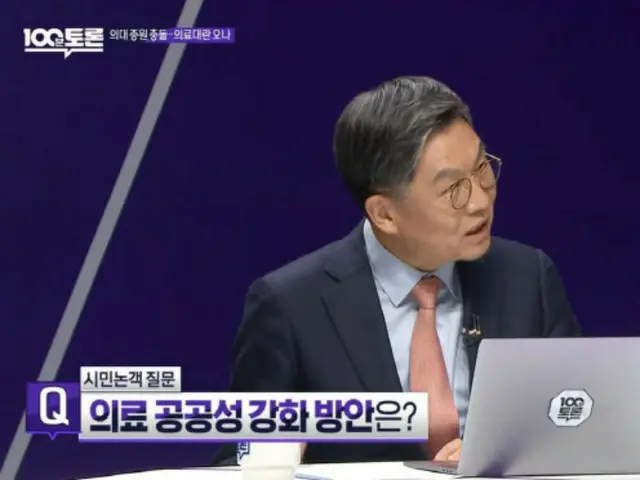MBC's ``100 Minute Debate'' broadcast on the 20th of this month said, ``Increase in medical school enrollment, conflicts, and medical chaos will occur.''
The discussion continued on the topic, ``What?'' On this day, Professor Kim said, ``In 2019, it was more than 200 million won (approximately 22.5 million yen), but now the annual salary of doctors at general hospitals has recently increased to 300 million to 400 million won (approximately 33 million yen).
``This is due to a shortage in the supply of doctors.'' At the same time, ``It is said that at university hospitals, specialized doctors work 80 hours.
Nearly 20,000 PAs, mainly nurses, are employed as medical assistants. "If there wasn't a shortage of doctors, this wouldn't be happening."
The moderator then spoke about concerns among doctors about mandatory medical avoidance.
I asked for their opinion. Professor Kim prefaced this by saying, ``If you graduate from medical school in our country and go to the military, you will be about 35 years old.At 35 years old, you will become a specialist and receive an annual salary of 300 to 400 million won.''
I heard it. Professor Kim said, ``However, if you go to another department and become the manager of a large company at the age of 35, your annual salary will be 100 million won (approximately 11.25 million yen).If you go to medical school, you can earn 300 to 400 million won, but even though you can study,
If you were told that you could earn only 100 million yen, of course everyone would want to go to medical school,'' he said, adding, ``The reason why there is a bias towards medical school is because the annual salary is overwhelmingly higher than choosing other professions.'' .
In the end, Professor Kim made it clear that in order to resolve the phenomenon of bias in medical schools, doctors' annual salaries must be lowered to an appropriate level. At the same time, ``Science and engineering students due to an increase in the number of medical school students''
"Taking into account the temporary phenomenon of a bias towards medical schools is a method of solving only superficial symptoms." On the other hand, Lee Dong Wook, chairman of the Gyeonggi-do Medical Association, said, ``20 years...
During that period, the number of doctors increased by 30%, but the phenomenon of avoiding essential medical care became even more severe. What kind of policies did the government implement to cause this to happen? Medical school graduates also have work-life balance
"Maybe they would prefer a place with better business hours and better working conditions." At the same time, ``Will essential medical care problems be solved simply by increasing the number of medical school students?'' Problems have arisen due to the limited number of doctors.
However, the clear fact is that the working environment for doctors in essential medical fields is extremely poor and inadequate. We must first improve the essential medical field."
2024/02/21 21:39 KST
Copyrights(C) Edaily wowkorea.jp 78

